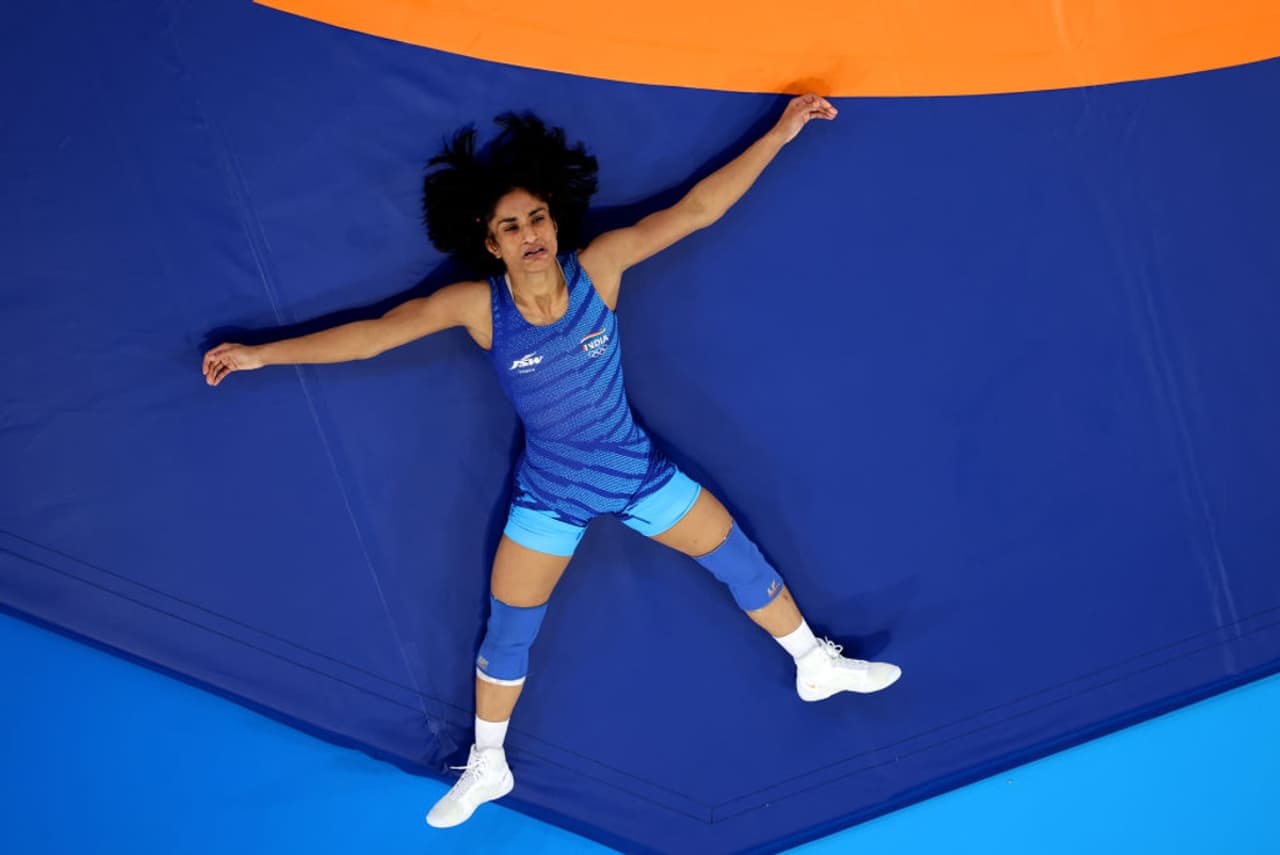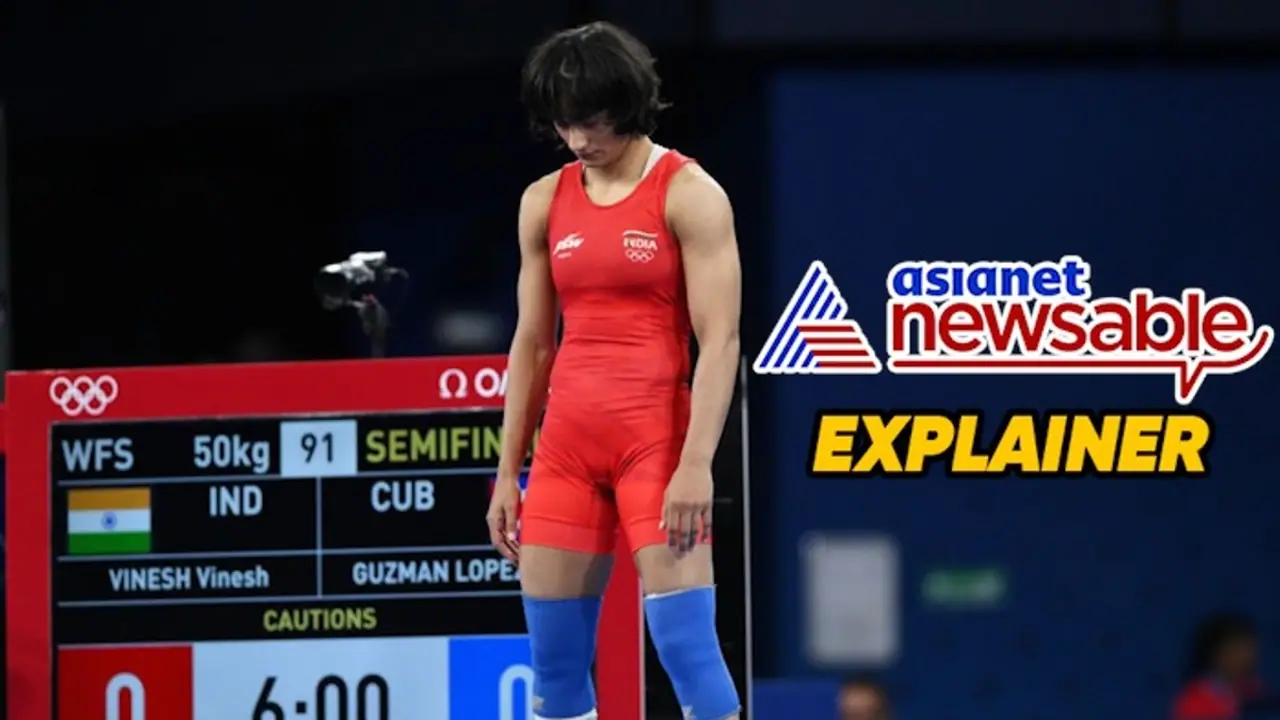In a heartbreaking turn of events, India’s Vinesh Phogat has been disqualified from her 50kg women's freestyle wrestling final at the Paris Olympics 2024 on Wednesday due to failing to meet the weight requirement on the day of the bout.
In a heartbreaking turn of events, India’s Vinesh Phogat has been disqualified from her 50kg women's freestyle wrestling final at the Paris Olympics 2024 on Wednesday due to failing to meet the weight requirement on the day of the bout. Phogat was scheduled to face USA's Sarah Hildebrandt in the gold medal match but was found to be '100 gm' over the 50kg limit during the morning weigh-in.

The weigh-in process is crucial in wrestling competitions and is strictly enforced at international events according to the International Wrestling Rules of United World Wrestling. According to Article 11 of the Competition Procedure, athletes must adhere to specific regulations during the weigh-in. Failure to attend or pass the weigh-in—whether it's the first or second weigh-in—results in disqualification from the competition, with the athlete being ranked last without a formal placement.
Here’s a breakdown of the rules and how they led to Phogat's disqualification:
Submission of Final Entries: Any changes to the final entries, such as adjustments due to injury, must be submitted by the team leader to the competition organizer by 12:00 PM the day before the weigh-in and competition. No changes are accepted after this deadline.
"If changes are made in the final entries compared to the entries in Athena (ONLY after exceptional circumstances like injury (confirmed by a medical certificate)), the updated athletes’ entry list must be submitted to the organizer by the team leader, without fail, at least at 12h00 the day before the weigh-in and the competition day of the concerned weight category. No changes will be accepted after this time," the article states.
Timing and Process of Weigh-Ins: Weigh-ins are conducted each morning for the concerned weight category. They last for 30 minutes. On the second morning, only wrestlers competing in repechages and finals must weigh in, and this session lasts 15 minutes.
"For all competitions, the weigh-in is organized each morning of the concerned weight-category. The weigh-in and the medical control last 30 minutes. The second morning of the concerned weight category only the wrestlers who participate in the repechages and finals have to come for the weigh-in. This weigh-in will last 15 minutes," Article 11 further states.

Medical Examination Requirement: Wrestlers must undergo a medical examination on the first morning. Only those who pass this examination and present their license and accreditation can participate in the weigh-in.
"No wrestler may be accepted at the weigh-in if he has not undergone a medical examination the first morning. Wrestlers must appear at the medical examination and the weigh-in with their license and accreditation. The only uniform allowed for the weigh-in is the singlet. After having been examined by qualified physicians who are obliged to eliminate any wrestler who presents any danger of contagious disease, the wrestler can be weighed-in. No weight tolerance will be allowed for the singlet," it notes.
Uniform and Weight Tolerance: Wrestlers must wear a singlet during the weigh-in, and no weight tolerance is allowed for the singlet. Wrestlers are also required to have their fingernails cut short and must be in perfect physical condition.
"Contestants must be in perfect physical condition, with their fingernails cut very short. Throughout the entire weigh-in period, wrestlers have the right, each in turn, to get on the scale as many times as they wish," Article 11 further notes.
Weigh-In Procedure: During the weigh-in period, wrestlers can weigh themselves multiple times. Referees ensure that all wrestlers meet the weight requirements for their category and are dressed correctly. Referees will not weigh a wrestler who is not properly dressed.
Consequences of Non-Compliance: If a wrestler fails to meet the weight requirement or does not attend the weigh-in, they are eliminated from the competition and ranked last. An injured wrestler from the first day is exempt from the second weigh-in and retains their results.
Article 11 states, "The referees responsible for the weigh-in must check that all wrestlers are of the weight corresponding to the category in which they are entered for the competition, that they fulfil all the requirements of Article 5 and to inform any wrestler of the risk he runs if he presents himself on the mat in incorrect dress. Referees will refuse to weigh a wrestler who is not dressed correctly."
Exceptions for injuries: If an athlete is injured on the first day of competition, they are exempt from attending the second weigh-in and will retain their results from the first day. These procedures ensure that all wrestlers compete fairly and within their designated weight categories. Strict adherence to these rules is essential for maintaining the integrity of the competition and ensuring the safety of all participants.
"The referees responsible for the weigh-in will receive the results of the draw and will be allowed to control only the athletes who are on this list. If an athlete does not attend or fails the weigh-in (the 1st or the 2nd weigh-in), he will be eliminated from the competition and ranked last, without rank. If an athlete is injured during the first day, he doesn’t have to attend the second weigh-in and will keep his results," it concludes.
Vinesh Phogat, who had reached the gold medal bout in the women’s 50kg category, was disqualified after being found 100 grams overweight during the morning weigh-in. Despite her historical achievement of reaching the final, the strict adherence to Article 11 meant that any excess weight results in automatic disqualification. This rule enforces a no-tolerance policy for weight deviations to ensure fairness and consistency across the competition.
The Indian Olympic Association confirmed the disqualification, emphasizing the rules' unyielding nature and requesting privacy for Phogat. Her disqualification not only ended her hopes for a medal but also highlighted the critical importance of adhering to weigh-in regulations in competitive wrestling.
"It is with regret that the Indian contingent shares news of the disqualification of Vinesh Phogat from the women's Wrestling 50kg class. Despite the best efforts by the team through the night, she weighed in a few grams over 50kg this morning," the IOA stated.
"No further comments will be made by the contingent at this time. The Indian team requests you to respect Vinesh's privacy. It would like to focus on the competitions on hand," it added.
The incident also drew attention to similar weight-related disqualifications in the 50kg category, such as Italy's Emanuela Liuzzi, illustrating the strict enforcement of weigh-in rules across the competition.
